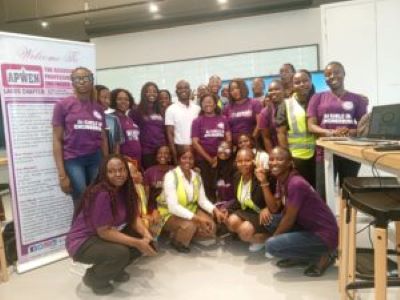Microsoft, in collaboration with the Association of Professional Women Engineers of Nigeria (APWEN), trained 38 women—comprising 36 female engineers and two journalists—on digital manufacturing skills to enhance industrial-scale production.
The participants underwent theoretical and practical sessions at the Microsoft Innovation Lab, Victoria Island, Lagos. They were later grouped to develop innovations and produce prototypes using computers, 3D printing, and 2D laser technology.
This training was part of the “Skill Up Lagos” initiative by APWEN’s Lagos State Chapter, targeting female engineering undergraduates from nine universities, professional engineers, journalists, and young engineers.
The Garage Manager at Microsoft, Nadu Isaac, explained the fundamentals and importance of digital manufacturing, highlighting key technologies such as CAD (Computer-Aided Design), 3D Printing, CNC (Computer Numerical Control) Machining, and Laser Cutting. Isaac shared real-world examples of how digital manufacturing revolutionises industries, factoring in environmental considerations.
During the session, Isaac led practical demonstrations of computer-aided manufacturing and design, guiding participants through creating prototypes. “We aim to equip them with the skills to design and produce finished products, leading to better outcomes,” he said.
APWEN Lagos Chairperson, Dr. Atinuke Owolabi, expressed gratitude to Microsoft for the partnership and urged both the Lagos State and Federal Governments to support the association. She revealed that while APWEN had an innovation lab donated by the University of Lagos, it was under-equipped and required additional gadgets and government intervention.
“We need 3D printers, cutting machines, engraving tools, and Compressed Natural Gas (CNG) machines to fully equip the lab. The skills learned today should continue beyond this training,” Owolabi said. She further appealed for government partnerships to establish more digital innovation centers to support the manufacturing sector in Nigeria.
Owolabi also called for government policies to empower more female engineers, enabling them to become entrepreneurs through the use of 3D and other digital manufacturing tools. She emphasized that these graduates and undergraduates could create jobs rather than seek employment.
Students from universities including the University of Lagos, Lagos State University, Covenant University, Bowen University, and Obafemi Awolowo University were among the participants.
An Electrical and Electronic Engineering graduate from Federal University Otuoke, Miss Faith Ade-Otoki, described the training as an “amazing experience” and highly impactful. Okiki Agbeleye, a young engineer from the Drainage Services Department of the Lagos State Public Works Corporation, shared how the innovations would help improve her job performance.
Other students specializing in civil, electrical, mechanical, chemical, structural, and computer engineering also showcased their finished prototypes, expressing their excitement about the skills they had gained.


